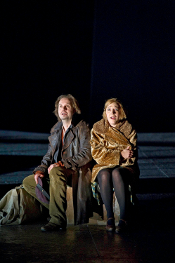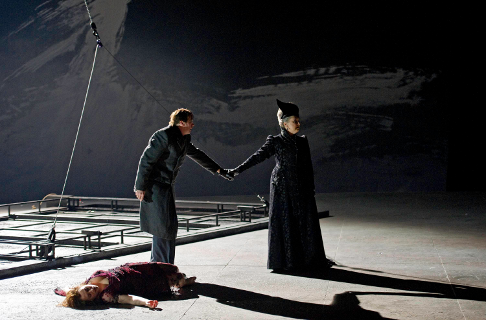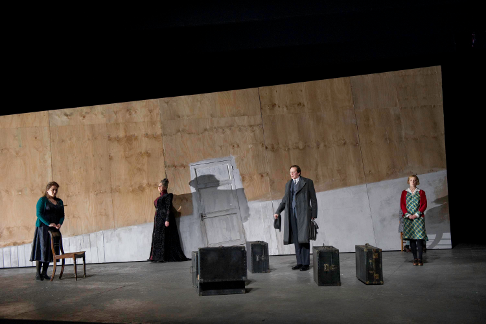![[Photo by Clive Barda courtesy of English National Opera]](http://www.operatoday.com/Katya_Kabanova_001.png)
17 Mar 2010
Katya Kabanova, London
Anguished, lacerating, irredeemably tragic, David Alden’s new production of Katya Kabanova presents a drama of unalleviated suffering and unremitting bleakness.
English Touring Opera are delighted to announce a season of lyric monodramas to tour nationally from October to December. The season features music for solo singer and piano by Argento, Britten, Tippett and Shostakovich with a bold and inventive approach to making opera during social distancing.
This tenth of ten Live from London concerts was in fact a recorded live performance from California. It was no less enjoyable for that, and it was also uplifting to learn that this wasn’t in fact the ‘last’ LfL event that we will be able to enjoy, courtesy of VOCES8 and their fellow vocal ensembles (more below …).
Ever since Wigmore Hall announced their superb series of autumn concerts, all streamed live and available free of charge, I’d been looking forward to this song recital by Ian Bostridge and Imogen Cooper.
The Sixteen continues its exploration of Henry Purcell’s Welcome Songs for Charles II. As with Robert King’s pioneering Purcell series begun over thirty years ago for Hyperion, Harry Christophers is recording two Welcome Songs per disc.
Although Stile Antico’s programme article for their Live from London recital introduced their selection from the many treasures of the English Renaissance in the context of the theological debates and upheavals of the Tudor and Elizabethan years, their performance was more evocative of private chamber music than of public liturgy.
In February this year, Albanian soprano Ermonela Jaho made a highly lauded debut recital at Wigmore Hall - a concert which both celebrated Opera Rara’s 50th anniversary and honoured the career of the Italian soprano Rosina Storchio (1872-1945), the star of verismo who created the title roles in Leoncavallo’s La bohème and Zazà, Mascagni’s Lodoletta and Puccini’s Madama Butterfly.
Evidently, face masks don’t stifle appreciative “Bravo!”s. And, reducing audience numbers doesn’t lower the volume of such acclamations. For, the audience at Wigmore Hall gave soprano Elizabeth Llewellyn and pianist Simon Lepper a greatly deserved warm reception and hearty response following this lunchtime recital of late-Romantic song.
Collapsology. Or, perhaps we should use the French word ‘Collapsologie’ because this is a transdisciplinary idea pretty much advocated by a series of French theorists - and apparently, mostly French theorists. It in essence focuses on the imminent collapse of modern society and all its layers - a series of escalating crises on a global scale: environmental, economic, geopolitical, governmental; the list is extensive.
For this week’s Live from London vocal recital we moved from the home of VOCES8, St Anne and St Agnes in the City of London, to Kings Place, where The Sixteen - who have been associate artists at the venue for some time - presented a programme of music and words bound together by the theme of ‘reflection’.
'Such is your divine Disposation that both you excellently understand, and royally entertaine the Exercise of Musicke.’
Amongst an avalanche of new Mahler recordings appearing at the moment (Das Lied von der Erde seems to be the most favoured, with three) this 1991 Mahler Second from the 2nd Kassel MahlerFest is one of the more interesting releases.
‘And there was war in heaven: Michael and his angels fought against the dragon; and the dragon fought and his angels, And prevailed not; neither was their place found any more in heaven … that old serpent … Satan, which deceiveth the whole world: he was cast out into the earth, and his angels were cast out with him.’
If there is one myth, it seems believed by some people today, that probably needs shattering it is that post-war recordings or performances of Wagner operas were always of exceptional quality. This 1949 Hamburg Tristan und Isolde is one of those recordings - though quite who is to blame for its many problems takes quite some unearthing.
There was never any doubt that the fifth of the twelve Met Stars Live in Concert broadcasts was going to be a palpably intense and vivid event, as well as a musically stunning and theatrically enervating experience.
‘Love’ was the theme for this Live from London performance by Apollo5. Given the complexity and diversity of that human emotion, and Apollo5’s reputation for versatility and diverse repertoire, ranging from Renaissance choral music to jazz, from contemporary classical works to popular song, it was no surprise that their programme spanned 500 years and several musical styles.
The Academy of St Martin in the Fields have titled their autumn series of eight concerts - which are taking place at 5pm and 7.30pm on two Saturdays each month at their home venue in Trafalgar Square, and being filmed for streaming the following Thursday - ‘re:connect’.
The London Symphony Orchestra opened their Autumn 2020 season with a homage to Oliver Knussen, who died at the age of 66 in July 2018. The programme traced a national musical lineage through the twentieth century, from Britten to Knussen, on to Mark-Anthony Turnage, and entwining the LSO and Rattle too.
With the Live from London digital vocal festival entering the second half of the series, the festival’s host, VOCES8, returned to their home at St Annes and St Agnes in the City of London to present a sequence of ‘Choral Dances’ - vocal music inspired by dance, embracing diverse genres from the Renaissance madrigal to swing jazz.
Just a few unison string wriggles from the opening of Mozart’s overture to Le nozze di Figaro are enough to make any opera-lover perch on the edge of their seat, in excited anticipation of the drama in music to come, so there could be no other curtain-raiser for this Gala Concert at the Royal Opera House, the latest instalment from ‘their House’ to ‘our houses’.
"Before the ending of the day, creator of all things, we pray that, with your accustomed mercy, you may watch over us."
![[Photo by Clive Barda courtesy of English National Opera]](http://www.operatoday.com/Katya_Kabanova_001.png)
Anguished, lacerating, irredeemably tragic, David Alden’s new production of Katya Kabanova presents a drama of unalleviated suffering and unremitting bleakness.
Therein, perhaps, lies the one weakness in this powerful and impressive staging. For Janačék’s opera, while admittedly melancholic and menacing, contains contrasting moments of ecstatic joy, matched by melting sonic radiance — moments which resonate with gleams of light and colour, but which were almost wholly subdued by the sinister grey tones of Alden’s vision.
Alden knows this territory well, as his 2006 Jenůfa and more
recent Peter Grimes testify. The slanted perspective of the steeply
raked set, lend an air of edginess. Sudden and extreme changes of lighting
(designed by Adam Silverman) cast monstrous shadows across the immense expanses
of the bare, decrepit stage, its distressed emptiness broken only by a lone
chair, a single lamp-post. All seems somewhat familiar … And indeed, as
an abstract portrait of torment and pain, it serves its purpose well. Yet, the
very vastness of this landscape makes it difficult to convey the claustrophobic
tension which suffocates the eponymous protagonist. Set in a stifling,
provincial community, Katya Kabanova relates the persecution and
destruction of a pure heart; Katya battles with her inner demons and struggles
against the mean-spirited hypocrisy of the mercantile Russian villagers who
judge her. It is the explosive shattering of the chains that bind her soul and
body that destroys the village’s self-righteous complacency, and propels
Katya to tragedy — Ostrovsky’s play, on which the opera is based,
is aptly called ‘The Storm’. But Charles Edward’s design,
which suggests the infinite vistas of the Siberian steppes, does not capture
the constriction and restriction which is both within and without the tragic
heroine. Alfie Boe as Vanya Kudrjas and Anna Grevelius as Varvara
Alfie Boe as Vanya Kudrjas and Anna Grevelius as Varvara
The characterisation of Katya by American soprano, Patricia Racette, making her debut at ENO, was in accord with Alden’s expressionistic conception. Her total isolation was sustained throughout, her psychological and spiritual distance from the other characters and her yearning for escape suggested by her frequent positioning at the furthest edges of the stage. Isolation increasingly became self-absorption; separated by the entire width of the stage, Katya and her lover, Boris (Stuart Skelton), seemed emotionally disconnected — Racette’s Katya is more in love with love than with this weak, pitiful merchant. Confident and sure throughout, Racette was certainly technically in command of the role. Yet, when Katya sings to Varvara in Act 1 of her youthful dreams, her melody should float and soar as easily and freely as the birds she has longed to emulate. Racette’s strong tone, together with a tense, close vibrato, seemed too mature, and lacked the sweetness and air of fragility which might express her essential innocence.
Janačék’s compression of Ostrovsky’s drama does to some extent render the characters one-dimensional. But Alden, and his costume designer, Jon Morrell, take this one step further, and reduce nearly all the other roles to caricatures. A floor-length black cloak hiding a glittering red gown, topped with a threatening, pointed headpiece, Susan Bickley’s Kabanicha is a terrifying figure of authority and intimidate — the stereotypical butt of all mother-in-law jokes, she resembles a vicious Lady Macbeth, dominating and demeaning all. Bickley’s full, true tone fortunately prevented this harridan from sounding as well as looking shrew-like; but, should she really so openly acknowledge her own hypocrisy and sexual avarice, brazenly turning the disapproving gaze of a religious icon to the wall before subjecting the willing Dikoy (Clive Bayley) to some degrading sexual bullying?
 Susan Bickley as Marfa Kabanicha and John Graham-Hall as Tikhon Ivanich Kabanov
Susan Bickley as Marfa Kabanicha and John Graham-Hall as Tikhon Ivanich Kabanov
The men, on the whole, were a pitiful and contemptible bunch. Both Boris and Tikhon are weak-willed, self-preserving specimens. Skelton sang lyrically, but his tone was rather lifeless — there was little to suggest that he could inspire Katya to such heights of passion. John Grahan Hall’s Tikhon was a wretched victim of his mother’s oppression, and at times he communicated the pathos of his situation, although like Bayley’s Dikoy, his mannerisms were frequently too exaggerated and over-blown. It was left to Anna Grevelius as Varvara and Alfie Boe as Kudrjas to introduce some convincing humanity into this community of grotesques. The brightness and energy of their singing injected a convincing sense of fun and spirit, Boe’s warm tone in particular conveying the optimism of youth. The healthy, down-to-earth practicality of this pair of lovers presented a stark contrast to the self-destructive, dreamy solipsism of Katya and the directionless ineptitude of Boris.
From the opening bars, where muted lower strings tenderly evoke Katya’s purity of spirit and the frailty of her hopes, as well as the dark depth of the river which will claim both, Mark Wigglesworth draw from his orchestra playing of exceptional clarity and rhythmic vitality. The layered textures of Janačék’s driving motifs were expertly constructed, each melodic pattern contributing to the meaning of the whole. Wigglesworth effectively built up the tension in Act 3, confidently controlling both the rhythmic onslaught and the silences, as the drama lurched to its bitter conclusion.
 Patricia Racette as Katerina Kabanova, Susan Bickley as Marfa Kabanicha, John Graham-Hall as Tikhon Ivanich Kabanov and Anna Grevelius as Varvara
Patricia Racette as Katerina Kabanova, Susan Bickley as Marfa Kabanicha, John Graham-Hall as Tikhon Ivanich Kabanov and Anna Grevelius as Varvara
On stage, in contrast to this detailed musical drama, the semiotics were unashamedly blatant. A vast propaganda poster depicting a Munch-like impression of hell prophesised damnation, its fall to the ground foreshadowing Katya’s own suicidal descent into the waters of the Volga. Why does she confess and leap into the treacherous waters? Katya is a victim not just of her own conscience. In such a soul-destroying, emotionally-deadened world, her innate life-spirit and passion can only find an outlet in religious devotion. And, she is watched and judged not just by God but by the Kabanicha and the village she represents. Thus, Katya is sacrificed to preserve a self-satisfied and repressive regime. However, in Alden’s view, Katya is as alone in death as she has been in life. Having reduced the repressive village to a few grotesque eccentrics, even the latter are distanced at the close, emotionally removed from the human loss which is so profoundly and poignantly conveyed in the music.
Claire Seymour